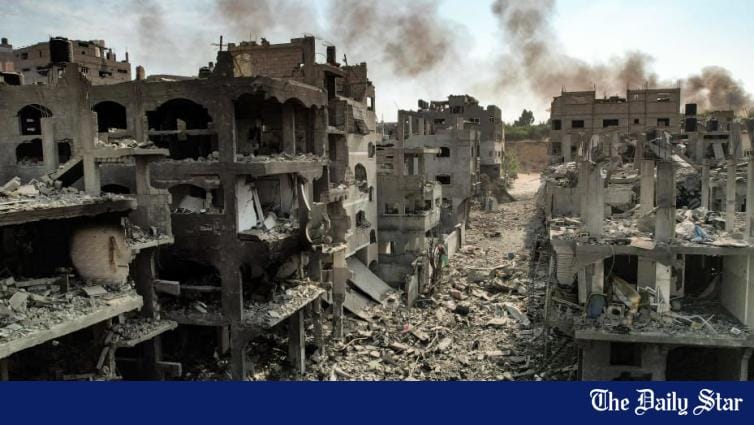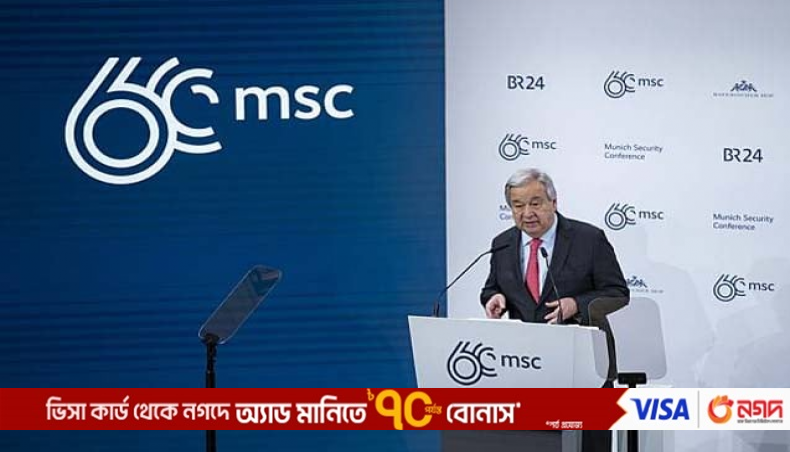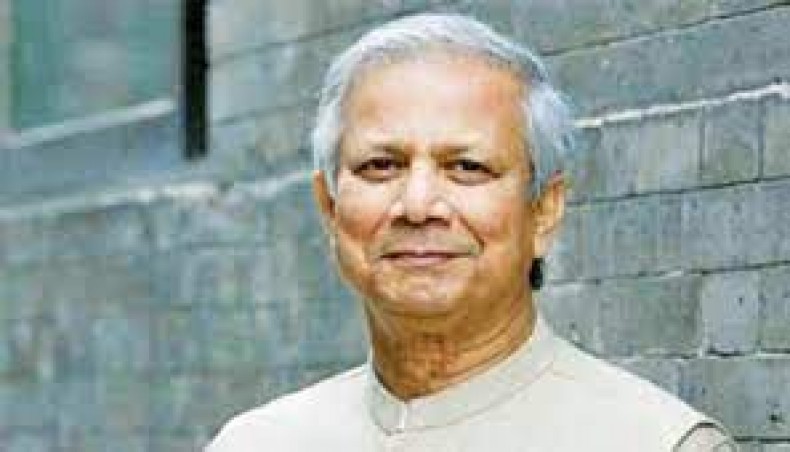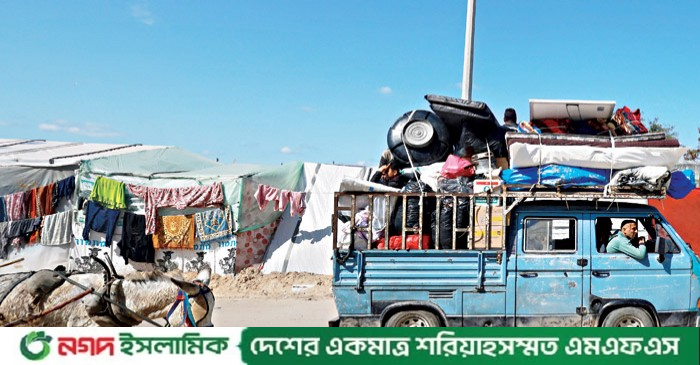The real Gaza death toll
Published: 00:00, Mar 09,2024
A medic carries an injured Palestinian child into Al-Shifa Hospital in Gaza City following an Israeli airstrike on October 11, 2023. — Palestinian News & Information Agency/Atia Darwish
Ralph Nader says it matters greatly whether the aggregate toll so far, and counting, is three, four, five, six times more than the Gaza health ministry’s undercount
SINCE the Hamas raid penetrated the multi-tiered Israeli border security on October 7, 2023, (an unexplained collapse of Israel’s defensive capabilities), 2.3 million utterly defenseless Palestinians in the tiny crowded Gaza enclave have been on the receiving end of over 65,000 bombs and missiles plus non-stop tank shelling and snipers.
The extreme right-wing Netanyahu regime has enforced its declared siege of, in its genocidal words, ‘no food, no water, no electricity, no fuel, no medicine.’
The relentless bombing has destroyed apartment buildings, marketplaces, refugee camps, hospitals, clinics, ambulances, bakeries, schools, mosques, churches, roads, electricity networks, critical water mains — just about everything.
The US-equipped Israeli war machine has even uprooted agricultural fields, including thousands of olive trees on one farm; bulldozed many cemeteries; and bombed civilians fleeing on Israeli orders, while obstructing the few trucks carrying humanitarian aid from Egypt.
With virtually no healthcare left, no medications, and infectious diseases spreading especially among infants, children, the infirm, and the elderly, can anybody believe that the fatalities have just gone over 30,000?
With 5,000 babies born every month into the rubble, their mothers wounded and without food, healthcare, medicine, and clean water for any of their children, severe scepticism about the Hamas’s health ministry’s official count is warranted.
Israeli prime minister Benjamin Netanyahu and Hamas, which he helped over the years, have a common interest in lowballing the death and injury toll. But for different reasons. Hamas keeps the figures low to reduce being accused by its own people of not protecting them, and not building shelters. Hamas grossly underestimated the savage war crimes by the vengeful, occupying Israeli military superpower fully and unconditionally backed by the U.S. military superpower.
The health ministry is intentionally conservative, citing that its death toll came from reports only of those named as deceased by hospitals and morgues. But as the weeks turned into months, blasted, disabled hospitals and morgues cannot keep up with the bodies, or cannot count those slain laying on roadsides in allies and beneath building debris. Yet the Health Ministry remains conservative and the “official” rising civilian fatality and injury count continues to be uncritically reported by both friend and foe of this devastating Israeli state terrorism.
Predictions of human catastrophe
IT WAS especially astonishing to see the most progressive groups and writers routinely use the same figures from the health ministry in Hamas-run Gaza as did the governments and outside groups backing the one-sided war on Gaza. All this despite predictions of a human catastrophe in the Gaza Strip almost every day since October 7, 2023, by arms of the United Nations, other besieged international relief agencies on the ground, eyewitness accounts by medical personnel and many Israeli human rights groups and brave local journalists in that strip, the geographic size of Philadelphia. (Unguided Western and Israeli reporters and journalists are not allowed to enter Gaza by the Israeli government.)
Then came the December 29, 2023, opinion piece in The Guardian by the chair of global public health at the University of Edinburgh, Devi Sridhar. She predicted half a million deaths in 2024 if conditions continue unabated.
In recent days, the situation has become more dire. In the March 2, 2024, Washington Post, reporter Ishaan Tharoor writes:
‘The bulk of Gaza’s more than 2 million people face the prospect of famine — a state of affairs that constitutes the fastest decline in a population’s nutrition status ever recorded, according to aid workers. Children are starving at the fastest rate the world has ever known. Aid groups have been pointing to Israel restricting the flow of assistance into the territory as a major driver of the crisis. Some prominent Israeli officials openly champion stymying these transfers of aid.’
Tharoor quotes Jan Egeland, chief of the Norwegian Refugee Council: ‘We must be clear: civilians in Gaza are falling sick from hunger and thirst because of Israel’s entry restrictions’, and ‘Life-saving supplies are being intentionally blocked, and women and children are paying the price.’
Martin Griffiths, the United Nations lead humanitarian officer, said, ‘Life is draining out of Gaza at terrifying speed.’
UN secretary general António Guterres, according to the Post, warned of an ‘“unknown number of people” — believed to be in the tens of thousands — lying under the rubble of buildings brought down by Israeli strikes.’
Volker Turk, the UN high commissioner for human rights, said, ‘All people in Gaza are at imminent risk of famine. Almost all are drinking salty and contaminated water. Healthcare across the territory is barely functioning’, and ‘Just imagine what this means for the wounded, and people suffering infectious-disease outbreaks… many are already believed to be starving.’
UNICEF, the International Rescue Committee, the Palestinian Red Crescent, and Doctors Without Borders are all relating that the same catastrophic conditions are getting worse fast.
Yet, and get this, in this article, the Post still stuck with the ‘more than 30,000 people in Gaza have been killed since the ongoing war began.’
Just like the entire mass media, many governments, even the independent media and critics of the war would have us accept that between 98 per cent and 99 per cent of Gaza’s entire population has survived — albeit the sick, injured, and more Palestinians about to die. This is lethally improbable!
From accounts of people on the ground, videos and photographs of deadly episode after episode, plus the resultant mortalities from blocking or smashing the crucial necessities of life, a more likely estimate, in my appraisal, is that at least 200,000 Palestinians must have perished by now and the toll is accelerating by the hour.
Imagine Americans, if this powerful US-made weaponry was fired on the besieged, homeless, trapped people of Philadelphia, do you think that only 30,000 of that city’s 1.5 million people would have been killed?
Daily circumstantial evidence of the deliberate Israeli targeting of civilians and civilian infrastructures requires more reliable epidemiological estimates of casualties.
It matters greatly whether the aggregate toll so far, and counting, is three, four, five, six times more than the health ministry’s undercount. It matters for elevating the urgency for a permanent cease-fire, and direct and massive humanitarian aid by the US and other countries, bypassing the sadistic cruelty against innocent families of the Israeli siege. It matters for the columnists and editorial writers who have been self-censoring, with some, like the Post’s Charles Lane, fictionally claiming that Israel’s military doesn’t ‘intentionally target civilians.’ It matters for accountability under international law.
Above all, it lets weak Secretary of State Antony Blinken and duplicitous president Biden be less servile when Netanyahu dismisses the low death toll by taunting them: What about Dresden, Hiroshima and Nagasaki?
As a percentage of the total population being killed, Gaza can expose the Israeli ruling racist extremists to a stronger rebuttal for ending US co-belligerent complicity in this never-to-be-forgotten slaughter of mostly children and women. (The terrifying PTSD on civilians, especially children, will continue for years.)
Respecting the more accurate casualty toll of Palestinian children, mothers, and fathers presses harder for permanent cease-fires and the process of recovery and reparations for the survivors of their holocaust.


















